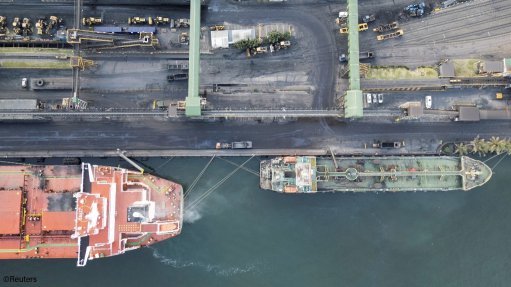More adventures in the Navy
In the previous column, I wrote about being in the Navy nearly 30 years ago. After reviewing, I find it is closer to 50 years ago. A thing to remember is that, 50 years ago, things were different. This is, of course, self-explanatory, but not as obvious as it seems. For example, Microsoft had just been founded and Bill Gates still had long hair, the information superhighway did not exist, all telephones were wired, and South Africa had a working postal and electricity delivery system. (Cruel, but I have to say it.)
Basic training had been tough. Those of us who had qualified at university were automatically promoted to training as candidate officers, known in the Navy as midshipmen. Warrant officers and other forms of rating back at that time had some badges on their shoulders. Junior officers had some (very thin) badges on their shoulders. Midshipmen had nothing at all, but a small insignia, which rightly showed how they were regarded: they were worth nothing or less than nothing.
If we were subject to large-scale exercises during basic training, the level was increased in officers’ training. The training was absolutely exhausting. We were taught skills and many of these at a high level. One of the most trained army troops are the Recces, the Reconnaissance Battalion. They had premises located above Saldanha Bay. We regularly exercised along the coast and, more often than not, left the Recces in the dust.
We often undertook exercises which involved one of us carrying a fellow sailor on his back. I have seen this exercise done on programmes related to the French Foreign Legion. We carried our fellows just like the Foreign Legion and certainly as far. Not all of our training was mindless exhaustion, or exhaustion per se. Obviously, being in the Navy, we had to do some training which involved the Navy.
Okay, this week’s trick question: What is a whaler? No, it’s not a big thing for catching whales; it’s a 27-ft-long small craft used by the British Navy, and thus the South African Navy, for sailing and, most specifically, sailing around Saldanha Bay. It’s a great vessel and, unfortunately, no longer available. I sailed a whaler, and at times rowed a whaler, many kilometres around Saldanha Bay, all in the course of training.
Of course, we had to learn how to be what we were trained to be, which was officers. To be Navy officers required marching and disciplinary skills, which were suitable for the South African Navy. These were poured into us along with the sailing, marching and general exercises to create something suitable for the Navy. Along with this all was a healthy dose of tradition. For example, in 1931, in the Invergordon Mutiny, the officers commanding set the punishment for the officers to be forced to carry their swords instead of having them clipped to their sides. This was still current in the South African Navy at my time.
The exhaustion that was part of Navy training became a recognised part of our routine. From this distant time, which is now, it is hard to believe that I, along with other young men, took part in an experience which was so gruelling and accepted without question.
When we finally came to the end of our Navy training, we were superbly fit, well trained and more or less ready for anything. We drank (but only beer and wine) and could absorb exhaustion without question. From officers’ training we moved to a location where we were going to begin some actual work. Following our move, the other midshipmen (my acquaintances) were promoted to Ensigns or not promoted at all. Owing to an error, which served me well, I was promoted to sub-lieutenant. I sewed the single thin stripe, circle and ornamental griffon onto my uniform. I was extremely proud.
If you were lucky, you were drafted to Navy Base Simonstown. At this navy base you could absorb the heaven of a navy base which had been in existence since World War II. I was drafted to a navy base in Durban.
Article Enquiry
Email Article
Save Article
Feedback
To advertise email advertising@creamermedia.co.za or click here
Press Office
Announcements
What's On
Subscribe to improve your user experience...
Option 1 (equivalent of R125 a month):
Receive a weekly copy of Creamer Media's Engineering News & Mining Weekly magazine
(print copy for those in South Africa and e-magazine for those outside of South Africa)
Receive daily email newsletters
Access to full search results
Access archive of magazine back copies
Access to Projects in Progress
Access to ONE Research Report of your choice in PDF format
Option 2 (equivalent of R375 a month):
All benefits from Option 1
PLUS
Access to Creamer Media's Research Channel Africa for ALL Research Reports, in PDF format, on various industrial and mining sectors
including Electricity; Water; Energy Transition; Hydrogen; Roads, Rail and Ports; Coal; Gold; Platinum; Battery Metals; etc.
Already a subscriber?
Forgotten your password?
Receive weekly copy of Creamer Media's Engineering News & Mining Weekly magazine (print copy for those in South Africa and e-magazine for those outside of South Africa)
➕
Recieve daily email newsletters
➕
Access to full search results
➕
Access archive of magazine back copies
➕
Access to Projects in Progress
➕
Access to ONE Research Report of your choice in PDF format
RESEARCH CHANNEL AFRICA
R4500 (equivalent of R375 a month)
SUBSCRIBEAll benefits from Option 1
➕
Access to Creamer Media's Research Channel Africa for ALL Research Reports on various industrial and mining sectors, in PDF format, including on:
Electricity
➕
Water
➕
Energy Transition
➕
Hydrogen
➕
Roads, Rail and Ports
➕
Coal
➕
Gold
➕
Platinum
➕
Battery Metals
➕
etc.
Receive all benefits from Option 1 or Option 2 delivered to numerous people at your company
➕
Multiple User names and Passwords for simultaneous log-ins
➕
Intranet integration access to all in your organisation


















